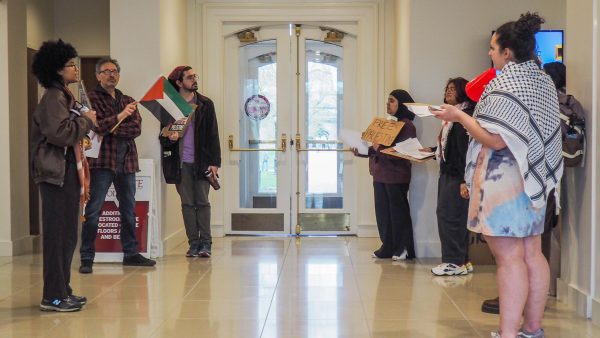Several faculty members expressed discontent with the Lafayette College administration’s response to last month’s pro-Palestine protest at a Thursday faculty meeting — the latest in a series of contrary communications between the faculty and administration regarding the protest.
Faculty members Rachel Goshgarian, Nandini Sikand, Hafsa Kanjwal and Jeremy Zallen read a written statement aloud to college President Nicole Hurd and attendees of the meeting. The statement was a response to a letter sent from Hurd to members of Lafayette’s faculty and staff on May 3, which itself was a response to an open letter sent by a group of faculty and staff to Hurd on April 30.
The statement read that Hurd’s response letter appeared to “largely misunderstand or intentionally misrepresent the concerns raised.”
“When we were finished reading, dozens of [faculty] members gave a standing ovation, with many more applauding in support,” Zallen wrote in an email. “After the meeting, the President affirmed that she would convey our statement to the board.”
The Lafayette was not able to contact other faculty members present at the meeting to verify how the statement was received.
The original letter to Hurd, signed by 52 members of faculty and staff, was sparked by the administration’s response to the protest on April 19, a peaceful event organized by a pro-Palestine student group, Pards 4 Palestine. The event prompted formal complaints and an email from interim Dean of Students Jenn Dize to individuals believed to be involved with the protest, warning them of the possibility of disciplinary action.
On the day of the protest, participants were allowed to continue protesting after Public Safety responded to multiple complaints about the event. A resulting report was sent to the Office of Student Conduct. Director of Public Safety Jeff Troxell declined to comment further on the event and deferred questions to Scott Morse, the college’s spokesman.
On April 25, Dize sent an email to several individuals who, according to the message, had been “identified in reports of disruptive behavior” on the day of the protest. In the email, Dize alerted its recipients to the possibility of conduct charges if they were to be found “responsible for violation(s)” and potential outcomes that may result from any “additional incidents.” Such potential outcomes were listed as probationary status, separation from the institution, parental notification and interim suspension.
“While I hope this information is unnecessary, I share it so you can make informed decisions moving forward,” Dize wrote.
When asked for comment, Dize deferred all questions to Morse, who did not respond to specific questions sent by The Lafayette. Several recipients of Dize’s email did not respond to requests for comment.

The ensuing faculty and staff letter to Hurd contained a list of the signers’ seven demands to the administration. The demands included a public apology to the students who received the email from Dize, a public explanation of how the emailed students were identified, a reconsideration of what the Student Handbook considers “disruptive behavior,” a “refrain from engaging in censure or reprisal of student protests and activism” and a commitment to conversations regarding “divestment from any organization or company that is financially backing Israeli ecocide, genocide and scholasticide.”
On May 3, Hurd responded to the letter with one of her own. In it, she addressed both the original events of the April 19 protest and the demands of the faculty.
Hurd cited “complaints by community members that describe potential violations of the Student Code of Conduct” as the reason for reviewing student conduct by Public Safety during the protest. These community members include students, staff members and guests, according to the letter.
Addressing the concerns raised about the email sent by Dize, Hurd wrote that the Office of Student Conduct had apologized to the students for “the confusion that letter created.”
“In retrospect, we all wish the initial outreach had been handled differently,” Hurd’s letter continued. “I assure you that the language and steps used in such communications with students are now under comprehensive review, which is necessary and appropriate.”
The letter also claimed that the Student Life division was already working to “review the entire conduct system” and add more opportunities for restorative practices — Vice President for Student Life Sarah Moschenross will be reporting on this topic to the Board of Trustees this month, according to the letter.
Moschenross did not respond to requests for comment.
In the statement read at the meeting, the faculty authors criticized Hurd’s use of the word “disruption” in her letter, claiming that the administration was falsely conflating “disruption” with “unsafety.” The authors then compared the alleged “disruption” of the pro-Palestine protest to the disruption of lawnmowers, construction and the activities of Greek-affiliated organizations.
“This raises important questions: which ‘disruptions’ matter? and, to whom? And, critically, when do disruptions rise to a level of sufficient gravity as to overwhelm the fundamental rights issues at stake?” the statement reads.
In response to the request for disclosure of college investments and conversations about divestment, Hurd’s letter affirmed that she would send the message of interest to the Board of Trustees.
Chief Investment Officer Krishna Memani and Aimee Torrisi, the administrative coordinator for the Board of Trustees, did not respond to requests for comment. Ellen Leslie, the executive assistant to Hurd, deferred requests for comment to the college’s communications division on Hurd’s behalf.
“We have nothing to add beyond what President Hurd conveyed in the response,” wrote Morse, the assistant vice president of the communications division, in an email, referring to Hurd’s May 3 letter.






































































































Rachel Goshgarian • May 18, 2024 at 9:12 pm
I am not sure how many faculty members stood up, but there were many standing and more clapping.
I wouldn’t pretend to know how many faculty at Lafayette consider what is currently happening in Gaza an “ecocide, genocide and scholasticide,” but I would direct anyone curious about why some might to Francesca Albanese’s report, available on the website of the Office of the High Commissioner for Human Rights (UN). (I can’t share link here). Please keep in mind that her report is from late March. It is now mid-late May and things have only gotten worse.
For more on Francesca Albanese, she is an Affiliate Scholar at the Institute for the Study of International Migration at Georgetown University, and a Senior Advisor on Migration and Forced Displacement for the think tank Arab Renaissance for Democracy and Development (ARDD). Her latest book, Palestinian Refugees in International Law (Oxford University Press, 2020), offers a comprehensive legal analysis of the situation of Palestinian refugees from its origins to modern-day reality.
As a correction, the initial open letter made no *demands* whatsoever of the President. The faculty and staff who wrote and signed the letter made *requests* of the President and the Lafayette administration. There is a difference between a request and a demand.
All the Best,
RG
Joshua Miller • May 18, 2024 at 5:58 pm
I want to make one small possible correction to the article. “When we were finished reading, dozens of [faculty] members gave a standing ovation, with many more applauding in support,” [Professor Jeremy] Zallen wrote in an email.” I scanned the room, and I would estimate that “several” gave a standing ovation. I talked to another professor today who estimated that there were 12-16. There may have been more standing faculty in the balcony. I agree that “many more” applauded in support of the letter. I am almost certain that the vast majority of the faculty and administration support peaceful protest, but I am curious whether or not the majority of the faculty believe that Israel has committed “ecocide, genocide, and scholasticide.”